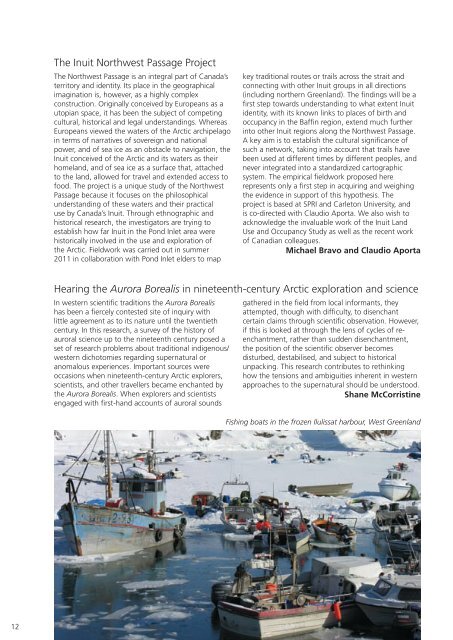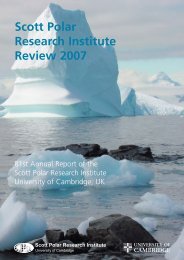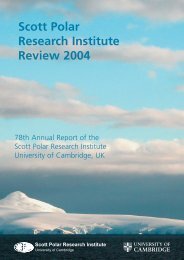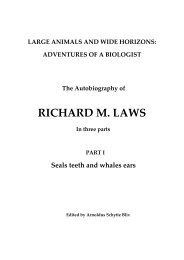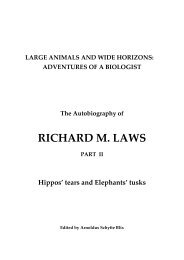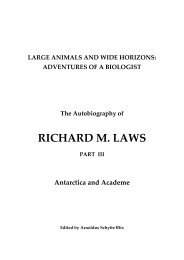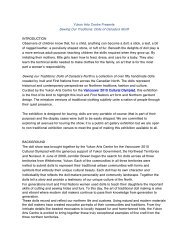PDF version of SPRI Review 2011 - Scott Polar Research Institute ...
PDF version of SPRI Review 2011 - Scott Polar Research Institute ...
PDF version of SPRI Review 2011 - Scott Polar Research Institute ...
You also want an ePaper? Increase the reach of your titles
YUMPU automatically turns print PDFs into web optimized ePapers that Google loves.
The Inuit Northwest Passage Project<br />
The Northwest Passage is an integral part <strong>of</strong> Canada’s<br />
territory and identity. Its place in the geographical<br />
imagination is, however, as a highly complex<br />
construction. Originally conceived by Europeans as a<br />
utopian space, it has been the subject <strong>of</strong> competing<br />
cultural, historical and legal understandings. Whereas<br />
Europeans viewed the waters <strong>of</strong> the Arctic archipelago<br />
in terms <strong>of</strong> narratives <strong>of</strong> sovereign and national<br />
power, and <strong>of</strong> sea ice as an obstacle to navigation, the<br />
Inuit conceived <strong>of</strong> the Arctic and its waters as their<br />
homeland, and <strong>of</strong> sea ice as a surface that, attached<br />
to the land, allowed for travel and extended access to<br />
food. The project is a unique study <strong>of</strong> the Northwest<br />
Passage because it focuses on the philosophical<br />
understanding <strong>of</strong> these waters and their practical<br />
use by Canada’s Inuit. Through ethnographic and<br />
historical research, the investigators are trying to<br />
establish how far Inuit in the Pond Inlet area were<br />
historically involved in the use and exploration <strong>of</strong><br />
the Arctic. Fieldwork was carried out in summer<br />
<strong>2011</strong> in collaboration with Pond Inlet elders to map<br />
key traditional routes or trails across the strait and<br />
connecting with other Inuit groups in all directions<br />
(including northern Greenland). The findings will be a<br />
first step towards understanding to what extent Inuit<br />
identity, with its known links to places <strong>of</strong> birth and<br />
occupancy in the Baffin region, extend much further<br />
into other Inuit regions along the Northwest Passage.<br />
A key aim is to establish the cultural significance <strong>of</strong><br />
such a network, taking into account that trails have<br />
been used at different times by different peoples, and<br />
never integrated into a standardized cartographic<br />
system. The empirical fieldwork proposed here<br />
represents only a first step in acquiring and weighing<br />
the evidence in support <strong>of</strong> this hypothesis. The<br />
project is based at <strong>SPRI</strong> and Carleton University, and<br />
is co-directed with Claudio Aporta. We also wish to<br />
acknowledge the invaluable work <strong>of</strong> the Inuit Land<br />
Use and Occupancy Study as well as the recent work<br />
<strong>of</strong> Canadian colleagues.<br />
Michael Bravo and Claudio Aporta<br />
Hearing the Aurora Borealis in nineteenth-century Arctic exploration and science<br />
In western scientific traditions the Aurora Borealis<br />
has been a fiercely contested site <strong>of</strong> inquiry with<br />
little agreement as to its nature until the twentieth<br />
century. In this research, a survey <strong>of</strong> the history <strong>of</strong><br />
auroral science up to the nineteenth century posed a<br />
set <strong>of</strong> research problems about traditional indigenous/<br />
western dichotomies regarding supernatural or<br />
anomalous experiences. Important sources were<br />
occasions when nineteenth-century Arctic explorers,<br />
scientists, and other travellers became enchanted by<br />
the Aurora Borealis. When explorers and scientists<br />
engaged with first-hand accounts <strong>of</strong> auroral sounds<br />
gathered in the field from local informants, they<br />
attempted, though with difficulty, to disenchant<br />
certain claims through scientific observation. However,<br />
if this is looked at through the lens <strong>of</strong> cycles <strong>of</strong> reenchantment,<br />
rather than sudden disenchantment,<br />
the position <strong>of</strong> the scientific observer becomes<br />
disturbed, destabilised, and subject to historical<br />
unpacking. This research contributes to rethinking<br />
how the tensions and ambiguities inherent in western<br />
approaches to the supernatural should be understood.<br />
Shane McCorristine<br />
Fishing boats in the frozen Ilulissat harbour, West Greenland<br />
12


